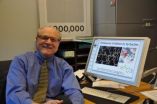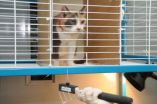(Press-News.org) BLOOMINGTON, Ind. -- Using a grown-up version of the rock-paper-scissors game, Indiana University cognitive scientists offer a new theory of the group dynamics that arise in situations as varied as cycles of fashion, fluctuations of financial markets, eBay bidding wars and political campaign strategies.
In a study written about this week in PLOS ONE, the researchers analyzed situations in which each person's decision depends on what they think other people will decide, looking at the riddle of "what you think I think you think I think."
What they found, said Seth Frey, doctoral candidate in the Department of Psychological and Brain Sciences in the IU College of Arts and Sciences, is that "people playing this kind of game subtly influence each other, converging on similar ways of reasoning over time. The natural analogy for the process is to a flock of birds veering in concert."
"Anticipation," he said, "may be the motor that keeps fads running in circles. It could be a source of the violent swings that we see in financial markets. Anyone in a bidding war on eBay may have been caught in this dynamic. If the bidders are tweaking their increasing bids based on the tweaks of others, then the whole group may converge in price and determine how those prices rise. The process isn't governed by the intrinsic value of that mint-condition Star Wars lunch box, but on the collective dynamics of people trying to reason through each other's thoughts."
Robert Goldstone, professor in the Department of Psychological and Brain Sciences, said they wanted "an elegant parable in a laboratory context" of the kind of real-world situations when people are trying to assess what other people are deciding. The researchers are interested in what the entire group looks like when everybody is trying to second guess everybody else.
"At a core level," he said, "people's guesses do converge, and that's interesting because dominant models suggest otherwise."
Nash equilibrium, for example -- the influential theory of John Nash, a mathematician portrayed in several films and the book "A Beautiful Mind" -- would predict that everyone will end up at random places with equal probability for each round. It's a theory, Goldstone said, "that assumes full rationality, full ability to reason about what you know I know you know I know."
Instead, "we are getting this systematic behavior, which is not random," he said. "Even though people are trying to beat each other out, they end up in synchronicity."
Whether looking at benign social habits or mass panics, Frey and Goldstone conclude, social theorists have always treated group behavior as though it resulted from a kind of mindlessness. But this lesson from rock-paper-scissors suggests that the most sophisticated reasoning can be caught up in the subtleties of social interaction.
The study, "Cyclic Game Dynamics Driven by Iterated Reasoning," is available online at PLOS ONE. This three-minute video explains the concept.
ROCK-PAPER-SCISSORS REVISITED
In the experiment, Frey and Goldstone introduce a version of rock-paper-scissors they call "the mod game." In each round, they gave small groups of five or six IU psychology undergraduates a choice of numbers from 1 and 24. Participants earned money for picking a number exactly one greater than a number chosen by someone else, with the choices wrapped around in a circle so that 1 beat 24.
Each student had to anticipate what others were going to pick, and pick the next number up, keeping in mind that everyone else was thinking the same thing. In this game of one-upmanship, the best performers aren't the ones who think the most steps ahead, but the ones who think just the right number of steps ahead -- about two, as it turned out in the experiment.
Experimental economists predict that sufficiently experienced people will continually increase the number of steps by which they think ahead. But this did not happen in the mod game. Instead, when participants were shown each previous round's results, they tended to cluster in one part of the circle of choices and start bounding around it in sync. Groups produced a compelling periodic orbit around the choices, reminiscent of the cultural pendulum swinging back and forth, bringing, say, mustaches in and out of fashion.
The cycling behavior consistently got faster with time. With more experience, people learned to think further ahead, so the economic prediction was partly correct. But the increase was much less dramatic than economists might have thought: After 200 rounds of the mod game, the average number of thinking steps increased by only half a step, from 2 to 2.5. Moreover, the synchronicity that occurs in this game turned out to benefit everyone; a tighter grouping of choices meant a higher density of money to be earned in each round.
Robert Goldstone, Chancellor's Professor of Psychological and Brain Sciences, directs the Percepts and Concepts Laboratory in the Department of Psychological and Brain Sciences at IU Bloomington. Seth Frey is a graduate student in the lab.
INFORMATION:
To speak with Goldstone or Frey, contact Liz Rosdeitcher at 812-855-4507 or rosdeitc@indiana.edu. For additional assistance, contact Tracy James at 812-855-0084 or traljame@iu.edu.
IU research: Rock-paper-scissors a parable for cycles in finance, fashion, politics and more
2013-02-20
ELSE PRESS RELEASES FROM THIS DATE:
New compound holds high promise in battling kidney cancer
2013-02-20
RIVERSIDE, Calif. — Chemists at the University of California, Riverside have developed a compound that holds much promise in the laboratory in fighting renal (kidney) cancer.
Named TIR-199, the compound targets the "proteasome," a cellular complex in kidney cancer cells, similar to the way the drug bortezomib, approved by the Food and Drug Administration, targets and inhibits the proteasome in multiple myeloma cells, a cancer coming from bone marrow.
Michael Pirrung, a distinguished professor of chemistry at UC Riverside, announced the development of TIR-199 in a lecture ...
Diagnosis and treatment now possible for osteoarthritic cats
2013-02-20
VIDEO:
Scientists at the University of Montreal's Quebec Research Group in Animal Pharmacology have found a way to recognize and treat osteoarthritis in cats -- a condition that the owner might...
Click here for more information.
Scientists at the University of Montreal's Quebec Research Group in Animal Pharmacology have found a way to recognize and treat osteoarthritis in cats – a condition that the owner might not notice and that can make even petting painful. "Osteoarthritis ...
Stanford researchers develop tool for reading the minds of mice
2013-02-20
If you want to read a mouse's mind, it takes some fluorescent protein and a tiny microscope implanted in the rodent's head.
Stanford scientists have demonstrated a technique for observing hundreds of neurons firing in the brain of a live mouse, in real time, and have linked that activity to long-term information storage. The unprecedented work could provide a useful tool for studying new therapies for neurodegenerative diseases such as Alzheimer's.
The researchers first used a gene therapy approach to cause the mouse's neurons to express a green fluorescent protein ...
That's the way the droplets adhere
2013-02-20
CAMBRIDGE, MA -- Understanding exactly how droplets and bubbles stick to surfaces — everything from dew on blades of grass to the water droplets that form on condensing coils after steam drives a turbine in a power plant — is a "100-year-old problem" that has eluded experimental answers, says MIT's Kripa Varanasi. Furthermore, it's a question with implications for everything from how to improve power-plant efficiency to how to reduce fogging on windshields.
Now this longstanding problem has finally been licked, Varanasi says, in research he conducted with graduate student ...
Artful science
2013-02-20
There are "things hidden in plain sight" all around us. But art can help students see their world anew, unlocking discoveries in fields ranging from plant biology to biomedical imaging, according to University of Delaware professor John Jungck.
Jungck's sentiments were echoed by a panel of experts speaking on "Artful Science" on Feb. 15 at the annual meeting of the American Association for the Advancement of Science (AAAS) in Boston. Jungck organized the panel and also spoke at the event.
Canoeing on a lake near his home in northwestern Minnesota when he was a youngster, ...
Powerful people are looking out for their future selves
2013-02-20
Would you prefer $120 today or $154 in one year? Your answer may depend on how powerful you feel, according to new research in Psychological Science, a journal of the Association for Psychological Science.
Many people tend to forego the larger reward and opt for the $120 now, a phenomenon known as temporal discounting. But research conducted by Priyanka Joshi and Nathanael Fast of the University of Southern California Marshall School of Business suggests that people who feel powerful are more likely to wait for the bigger reward, in part because they feel a stronger connection ...
Engineering control theory helps create dynamic brain models
2013-02-20
BOSTON -- Models of the human brain, patterned on engineering control theory, may some day help researchers control such neurological diseases as epilepsy, Parkinson's and migraines, according to a Penn State researcher who is using mathematical models of neuron networks from which more complex brain models emerge.
"The dual concepts of observability and controlability have been considered one of the most important developments in mathematics of the 20th century," said Steven J. Schiff, the Brush Chair Professor of Engineering and director of the Penn State Center for ...
New approach alters malaria maps
2013-02-20
UNIVERSITY PARK, Pa. – Identifying areas of malarial infection risk depends more on daily temperature variation than on the average monthly temperatures, according to a team of researchers, who believe that their results may also apply to environmentally temperature-dependent organisms other than the malaria parasite.
"Temperature is a key driver of several of the essential mosquito and parasite life history traits that combine to determine transmission intensity, including mosquito development rate, biting rate, development rate and survival of the parasite within the ...
Mutant champions save imperiled species from almost-certain extinction
2013-02-20
Species facing widespread and rapid environmental changes can sometimes evolve quickly enough to dodge the extinction bullet. Populations of disease-causing bacteria evolve, for example, as doctors flood their "environment," the human body, with antibiotics. Insects, animals and plants can make evolutionary adaptations in response to pesticides, heavy metals and overfishing.
Previous studies have shown that the more gradual the change, the better the chances for "evolutionary rescue" – the process of mutations occurring fast enough to allow a population to avoid extinction ...
NASA saw Tropical Storm Haruna come together
2013-02-20
Tropical Storm Haruna came together on Feb. 19 in the Southern Indian Ocean and two NASA satellites provided visible and infrared imagery that helped forecasters see the system's organization.
A low pressure area called System 94S developed on Friday, Feb. 15 in the northern Mozambique Channel. Over the course of four days System 94S became more organized and by Feb. 19 it became Tropical Storm Haruna.
On Tuesday, Feb. 19, Tropical Storm Haruna had maximum sustained winds near 35 knots (40.2 mph/64.8 kph). Haruna was located in the Mozambique Channel, near 21.4 south ...





